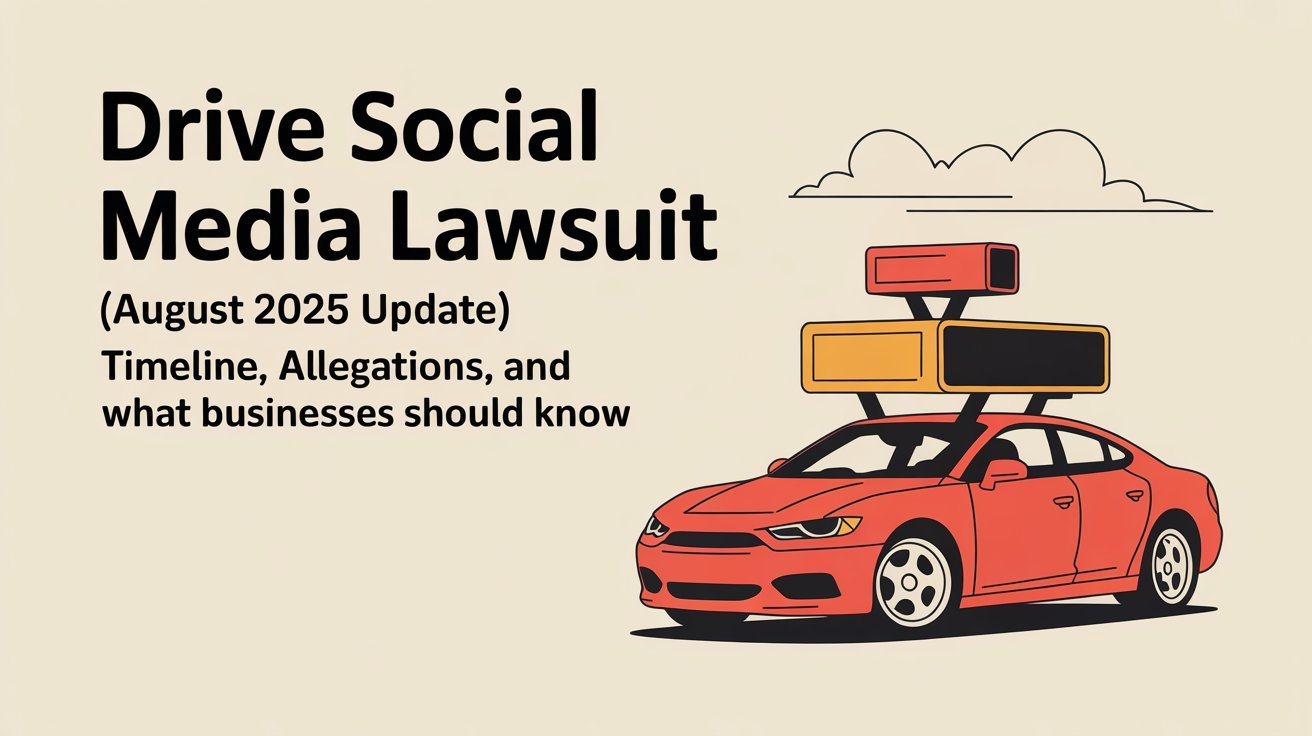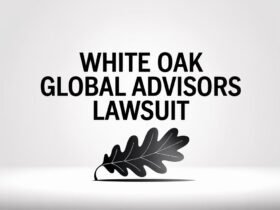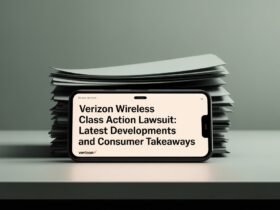The phrase “Drive Social Media lawsuit” has become a popular search query in 2025, raising questions among business owners, marketers, and legal professionals. Some wonder whether the case involves an actual lawsuit filed in court, while others speculate that it may simply be a term circulating through blogs, SEO-driven articles, and online complaints. This article explores the background of Drive Social Media, the reasons behind the lawsuit discussions, reported allegations, potential legal frameworks, and what businesses should know to protect themselves when engaging with marketing agencies.
What Is Drive Social Media?
Drive Social Media is a U.S.-based digital marketing agency that has built a reputation for aggressive advertising strategies, lead generation campaigns, and social media management. The company primarily serves small to mid-sized businesses across industries such as retail, hospitality, professional services, and e-commerce.
Over the years, Drive Social Media positioned itself as a results-driven agency, often promoting bold claims of return on investment (ROI). Its business model emphasizes measurable growth, targeting entrepreneurs who want rapid visibility on platforms like Facebook, Instagram, TikTok, and LinkedIn. While this approach has attracted many clients, it has also sparked scrutiny—especially when marketing promises do not align with actual outcomes.
Why “Drive Social Media Lawsuit” Is Trending
In August 2025, the phrase “Drive Social Media lawsuit” is widely searched, but the context varies. Some articles claim that litigation has been filed against the company, while others suggest that the phrase is primarily used as clickbait SEO content. Regardless, several factors explain the surge in interest:
- Customer Complaints: Dissatisfied clients have shared negative experiences on forums, review sites, and consumer complaint boards.
- Contract Disputes: Agencies often face backlash when customers feel locked into contracts that they cannot easily terminate.
- SEO Amplification: Rival firms and bloggers have leveraged the “lawsuit” keyword to rank on Google, creating more noise than clarity.
This combination of actual grievances and online speculation has made it difficult to distinguish between verified litigation and mere digital chatter.
Reported Allegations Against Drive Social Media
While not all claims can be verified in court, recurring themes have appeared in discussions surrounding the Drive Social Media lawsuit. The most common allegations include:
- Overpromising ROI: Some clients claim they were guaranteed specific results, such as doubling leads or achieving dramatic sales increases, which did not materialize.
- Opaque Contracts: Complaints suggest that termination clauses, refund policies, and performance guarantees were unclear or unfavorable.
- Reporting Issues: A number of businesses have alleged that marketing reports lacked transparency, making it difficult to track true ROI.
- Pressure Sales Tactics: Some sources mention that clients felt pressured into signing long-term contracts without sufficient review time.
These allegations, while significant, remain unproven unless validated in official court filings.
Company Response and Public Statements
Drive Social Media has generally positioned itself as a high-performance marketing partner, emphasizing data-driven strategies. While specific responses to lawsuit allegations vary, companies in this situation typically:
- Deny wrongdoing, emphasizing that marketing outcomes depend on multiple factors beyond agency control.
- Highlight success stories to balance negative press.
- Reiterate contract transparency, noting that all clients sign agreements with clear terms.
At present, official statements from Drive Social Media appear limited, leaving much of the public discussion shaped by third-party commentary.
Is There an Actual Court Case?
One of the most important distinctions in the Drive Social Media lawsuit narrative is whether a case has been filed in court. As of August 2025, no widely reported class action or consolidated litigation has surfaced in federal or state court records. However, it is possible that:
- Individual lawsuits may exist but have not received national media attention.
- Arbitration cases are ongoing, since many contracts require disputes to be handled privately rather than in public courts.
- Threats of litigation are fueling online chatter, even if formal filings are minimal.
For business owners seeking clarity, the best approach is to check official court dockets or request case information from a lawyer rather than relying solely on online claims.
Legal Frameworks That Typically Apply
If allegations against Drive Social Media or similar agencies were pursued legally, they would likely fall under:
- Consumer Protection Laws: Prohibiting false or misleading advertising.
- Contract Law: Covering performance obligations, breach of agreement, and remedies.
- Advertising Standards: Ensuring claims are substantiated and compliant with FTC guidelines.
- Data Privacy & Attribution Rules: Governing how customer data is tracked and reported in marketing dashboards.
Each of these legal areas creates potential exposure for agencies that make aggressive marketing claims without sufficient safeguards.
Common Evidence in Marketing Lawsuits
Marketing disputes can be difficult to litigate because outcomes are influenced by many variables. Still, evidence that often arises includes:
- Sales Proposals: Promises or guarantees made in sales decks.
- Contracts & Amendments: Terms regarding KPIs, termination, and refund rights.
- Campaign Reports: Data transparency and attribution models.
- Email Correspondence: Internal communication on expectations and performance.
Agencies typically argue that ROI depends on client cooperation, market trends, and unpredictable algorithm shifts, while plaintiffs argue that explicit guarantees created binding obligations.
Business Impact: What Clients Should Know
For businesses considering or already working with Drive Social Media, the lawsuit narrative raises important lessons:
- Review Contracts Carefully: Pay attention to cancellation clauses, arbitration requirements, and refund language.
- Demand Transparent Reporting: Ensure campaign data is shared in dashboards that you can independently verify.
- Set Realistic Expectations: Marketing ROI is rarely guaranteed, especially in competitive industries.
- Document Everything: Keep written records of promises, deliverables, and reports for potential future disputes.
Being proactive in these areas can help minimize risk while still benefiting from agency expertise.
Lessons for Marketing Agencies
The conversation around the Drive Social Media lawsuit also offers broader takeaways for marketing professionals:
- Avoid Overpromising: Sales teams should avoid absolute guarantees of ROI.
- Improve Transparency: Clear reporting, frequent updates, and documented processes build trust.
- Crisis Management: Agencies should have playbooks for addressing complaints quickly before they escalate into legal disputes.
- Ethical Standards: Long-term success requires prioritizing client trust over short-term sales wins.
Agencies that fail to adopt these practices risk both reputational damage and legal exposure.
Related Social Media Litigation
The Drive Social Media lawsuit is not happening in isolation. Over the past few years, social media platforms themselves—such as Meta, TikTok, and Snap—have faced lawsuits related to youth addiction, mental health, and advertising practices. While Drive Social Media’s issues are agency-specific, they fit within a broader pattern of heightened legal scrutiny around digital marketing and platform use.
How to Verify the Lawsuit Status
Given the mixture of fact and speculation online, here are ways to verify whether Drive Social Media is officially facing a lawsuit:
- Check Court Dockets: Federal and state court portals often allow free or low-cost searches by company name.
- Look for Docket Numbers: Credible news sources will cite specific case numbers.
- Be Wary of Clickbait: Articles without citations, filings, or sources may be SEO-driven content designed to capture traffic.
Taking these steps helps avoid misinformation while ensuring accurate understanding of legal risks.
Practical Next Steps for Concerned Clients
If you are a client of Drive Social Media—or considering hiring any marketing agency—practical steps include:
- Conduct a Contract Audit with legal counsel.
- Request an Independent Marketing Audit from a third-party analyst.
- Engage in Good-Faith Negotiations before pursuing litigation.
- Preserve Documentation of all marketing activities and communications.
These steps protect your business interests and prepare you for either dispute resolution or litigation, should the need arise.
Conclusion
The phrase “Drive Social Media lawsuit” reflects both genuine business concerns and amplified online speculation. While there is no publicly confirmed class action or large-scale litigation as of August 2025, the attention underscores broader issues of transparency, contractual fairness, and ROI accountability in the marketing industry.
For businesses, the key takeaway is to engage carefully with agencies, demand clarity in contracts and reporting, and avoid relying on vague promises. For agencies, the lesson is to prioritize transparency, ethics, and client trust.
As the situation evolves, it is critical to separate fact from rumor and approach the issue with both legal awareness and practical safeguards.
Also read more interesting topics at mgtimes.co.uk.






Leave a Reply